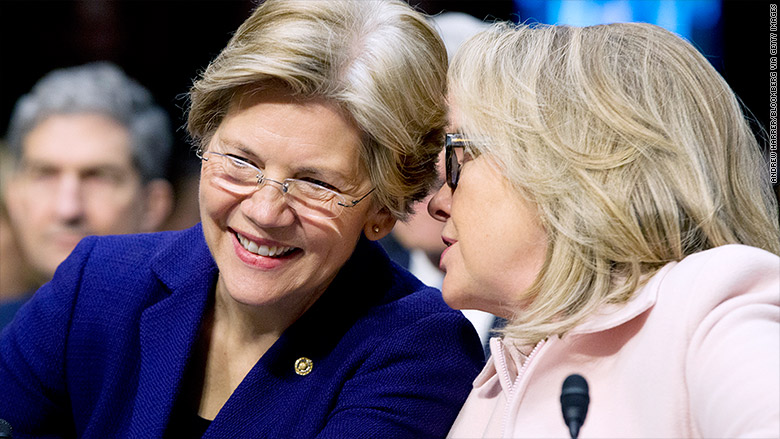
If you close your eyes, you might think Elizabeth Warren is talking.
In her video campaign announcement Sunday, Hillary Clinton unveiled what's expected to be the central theme of her presidential bid: Serving as a champion for "Everyday Americans."
"Americans have fought their way back from tough economic times, but the deck is still stacked in favor of those at the top," she said in the short video. "Everyday Americans need a champion and I want to be that champion. So you can do more than just get by. You can get ahead and stay ahead."
Long considered a centrist, Clinton sounded strikingly similar to Warren, the outspoken darling of the left wing, which has been pushing the Massachusetts senator to run for the 2016 nomination. (So far, she has declined.) Warren's main talking point: Give every American a fighting chance.
"America's middle class is under attack. It's in trouble because the game is deliberately rigged," Warren wrote in her memoir, A Fighting Chance. "I am determined -- fiercely determined -- to do everything I can to help us once again be the America that creates opportunities for anyone who works hard and plays by the rules."
Related: Elizabeth Warren: 8 ways to restore the middle class
Warren's proposals to boost middle class prosperity include: Raising the minimum wage, supporting bargaining rights for workers, ensuring workers get overtime pay and creating good paying jobs through investments in roads, bridges, power grids, education and research, among other things.
In an election where every candidate is focused on the middle class, Clinton may have to shift left to appeal to the Democratic base. She and her advisers have been speaking to income inequality and economic mobility gurus, including Joseph Stiglitz of Columbia University and Raj Chetty of Harvard, according to media reports.
Stiglitz, a Nobel-prize winning economist, has argued that income inequality has exploded over the past 30 years. The widening gap endangers economic growth and makes it harder for people to achieve the American Dream.
Related: Stiglitz on how to fix the income gap
Chetty, on the other hand, focuses on economic mobility. His work has found that residents in communities with higher rates of segregation and income inequality, as well as fewer two-parent families, are less likely to climb the economic ladder.
Clinton's new top talking point is increasing opportunity for all Americans. She reiterated this in a new epilogue to the paperback versions of her book, Hard Choices, excerpted on Huffington Post on Friday. In it, she noted the advantages that her first grandchild, Charlotte, will have.
"Too few of the children born in the United States and around the world today will grow up with the same opportunities as Charlotte," she wrote. "I'm more convinced than ever that our future in the 21st century depends on our ability to ensure that a child born in the hills of Appalachia or the Mississippi Delta or the Rio Grande Valley grows up with the same shot at success that Charlotte will."

But some diehard liberal Democrats, including Warren, want to hear more on how Clinton plans to reduce inequality. So far, they say Clinton's message is long on rhetoric and short on specific policies.
A Clinton spokesman did not respond to a request for comment.
Related: Hillary Clinton puts her love of Elizabeth Warren in writing for Time 100 list
New York City Mayor Bill de Blasio, who managed Clinton's Senate campaign in 2000, made waves when he said Sunday that he is holding off on endorsing Clinton until he learns more about her vision.
Warren, meanwhile, is also waiting for more details.
Asked in February by the Reverend Al Sharpton on MSNBC whether Clinton would be a "progressive warrior," Warren said "that's what we've got to see."
"I want to hear what she wants to run on and what she says she wants to do," Warren said.


